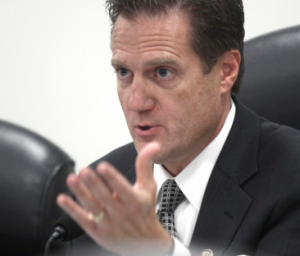
Congressman Mike Turner represents Ohio’s Tenth District. He was first elected to Congress in 2002
It’s hard to understand why Dayton voters keep returning Mike Turner to Congress. The “Campaign for America’s Future” tracks ten key congressional votes dealing with the economy and the middle class, and Mike Turner, my congressman to the U.S. Congress, according to this organization, is the worst of the worst and deserves a score of zero. In its report, the CAF analyzes ten pieces of legislation and, Mike Turner, in every case voted against the middle class. Turner voted for the Ryan Budget, voted against a jobs bill, voted to diminish consumer financial protection, voted to weaken unions, voted to repeal Obamacare. Here are the ten votes:
- Voted for the Republican FY 2013 Budget (The Ryan Budget) — Would slash domestic spending including converting Medicare into a voucher program,
- Voted against the FY 2013 Progressive Caucus Budget for All — H.Con. Res. 112 amendment would reduce long-term federal debt through short-term job-creation measures, such as increased spending on rebuilding roads and schools.
- Voted for the Job Protection and Recession Prevention Act — Extends the Bush tax cuts giving millionaires an average bonus of $160,000 next year.
- Voted for the Regulations from the Executive in Need of Scrutiny (REINS) Act — H..R. 10 would allow Congress to exercise veto power over the health, safety and environmental regulations the executive branch writes to implement legislation.
- Voted for the Consumer Financial Protection and Soundness Improvement Act — Guts the ability of the Consumer Financial Protection Bureau to protect consumers.
- Voted for the Workforce Democracy and Fairness Act — Diminishes the rights of private-sector workers to hold union elections.
- Voted for the South Korea Trade Agreement — H.R. 3080 lowers tariffs on U.S. auto exports to Korea while maintaining incentives for outsourcing of U.S. jobs.
- Voted for the Surface Transportation Extension Act — H.R. 4348 would weaken environmental protection efforts, fast-track the controversial Keystone XL pipeline and widen the gap between transportation needs and available funding.
- Voted for the Interest Rate Reduction Act — H.R. 4628 keep student loan borrowing costs low for 7 million college students but at the cost of ending a vital public health program.
- Voted for the Repeal of Obamacare Act — The 31st failed attempt by Congressional Republicans to repeat the Affordable Care Act.
The Campaign for America’s Future explains:
There are many guides that seek to measure how “liberal” or “conservative” an elected official is, but this guide takes on the unique task of measuring members of Congress against the kitchen-table needs and concerns of middle-class voters. Put another way, this is an effort to look at the votes and priorities of Congress through the lens of the daily economic struggles of working families, unemployed people, students, retirees — all those who consider themselves members of the middle class or who are trying to climb their way into the middle class.
That focuses this guide on a particular set of priorities: an economy that produces ample numbers of good jobs — jobs with living wages and strong benefits; health care that is affordable and accessible; top-quality education that fully equips children for the challenges of tomorrow without crippling them with debt; watchdogs who stand against those who would prey upon consumers or poison the environment; economic protection for those going through hard times, simple dignity for seniors at the end of a long worklife., and a democracy in which the voices of ordinary citizens are not drowned out by the rich and powerful.
The key votes in the 112th Congress graded in this voter guide symbolize this range of priorities. It is not a comprehensive measure of all of the consequential decisions that were made on the floor of the House and Senate that impacted middle- class voters. Before Congress went on its August 2012 summer recess, the House had passed 263 bills, and the Senate had passed 66. Many of these bills would have had significant impact, for better or worse, on the day-to-day lives of working people had they been signed into law. (Many of these bills are featured on TheMiddleClass.org.)
The key votes in this guide serve as a clear measure of whether legislators were defending the interests and concerns of the broad middle class. The bills were chosen before we compiled how legislators had voted.
Sharen Neuhardt is the Democratic challenger to Mike Turner

























